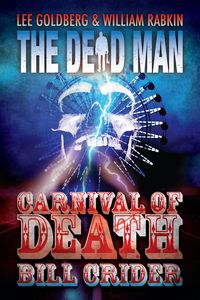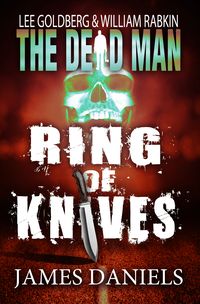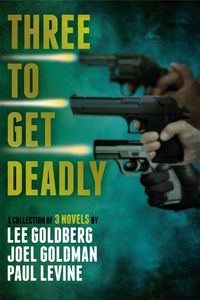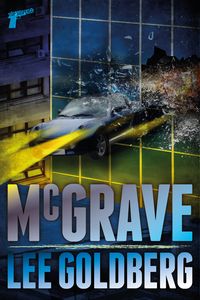Everything is Connected
I've got some good news: Amazon has ordered 12 more books in the DEAD MAN series…in digital, print and audio…on top of the 12 that they ordered back in September. That will keep the monthly series of original novellas going into 2013 (book #9, CARNIVAL OF DEATH, comes out in a few weeks).
The renewal comes just as DEAD MAN VOLUME 1, a digital and print compilation of the first three DEAD MAN tales, and the audio edition are released.
And, even more amazing, the news came almost to the day that Bill Rabkin and I self-published FACE OF EVIL, the first DEAD MAN tale, one year ago this month. Last February, I had the silly fantasy that Amazon would see the potential of the series and become our publisher…little did I know how quickly that dream would come true.
But I owe that to a series of events that began in an "Introduction To TV Writing" class I was teaching at UCLA back in 2007. One of my students was a guy named Mike Daniels. The goal of the class was for students to leave with a solid outline that they could use to write their first spec script in the "Introduction to Screenwriting" class. But it was clear to me that Mike was far too talented to be wasting his time writing an outline…he should go to script now. So asked I him to continue participating in class, but to start writing the script and share his pages with me on the side. He did.
By the end of the term, he'd turned out a brilliant RESCUE ME spec…and, if memory serves, a spec pilot script as well. At the end of that last class, I told him he was as good, if not better, than most TV writers that I knew and to stop wasting his time taking classes…he was ready to conquer the TV biz.
And he did.
Within a year, he was on staff of ONE TREE HILL. Today, he's married to one of the actresses from the show and a producer on SONS OF ANARCHY.
What does all of this have to do with THE DEAD MAN?
Not long after our class was over, Mike asked me if I'd read an unpublished novel that his brother James had written. James was a lawyer, but on the side he also narrated books for Brilliance Audio. I agreed, with more than a little hesitation, to read the book. Much to my surprise, I really liked the book…it was clear he had enormous talent…but the story needed a lot of work. I suggested some revisions to the opening chapters, which James made, and then referred the book to my agent. She saw the potential too and took him on…and although she wasn't able to sell the book, I never forgot it or how talented he was. When the DEAD MAN came along, I asked him if he wanted to write one. He did…and the book turned out to be RING OF KNIVES, the second in our series.
When RING OF KNIVES came out, James told all of his friends at Brilliance Audio about the book…and when they read it, they thought that it, and the other books in the series, would make great audiobooks.
Since Brilliance is owned by Amazon, word about their interest in the series soon filtered up to the editors at Amazon Encore and Thomas & Mercer…who called me about the print rights.
And you know how the rest of the story goes…
But the capper is that James, and his brother Luke, are narrating the audiobooks (James narrates his books, Luke narrates all of the others). Is that just too perfect?
Anyway, this all goes to show how everything is connected…and that you have no idea how something you do today could pay off in unexpected, unimagined ways years from now.
The Mail I Get
Whenever a new MONK book comes out, I get swamped with lots of mail from fans. Most of it is very kind and I love to get it. But I also get some like these:
i love your books and really want to read them, but my libary's stock of your books are out. any ideas? But if you want to be really nice, you would mail a hardcover copy of your latest book to:
XYZ
Edison, NJ 08817
Here's another:
Mr. Goldberg – I am a Monk fan and I love your books. However, you really go too far sometimes with his idiosyncracies. With the pestilence and world destruction when he sees a crack in the sidewalk type of thing. It's really far above and beyond his behavior on screen, and makes for a bad read. I usually have to skip over all those areas, and I find those silly discussions clutter the books and detract from the reading experience. Otherwise, the books are very entertaining.
And another:
My mother loves your books and gets them from the library all the time. I told her I knew you so please send her a signed copy by March 1 because that is her birthday. Here is her address: XYZ Sign it with your full name and say something clever (You can come up with that on your own). I would like to meet you some day because you are so funny.
Three To Get Deadly
You gotta grab THREE TO GET DEADLY…a trio of stunning bestselling novels of action and suspense from three masters of the craft…in a single, thrill-packed volume!
TO SPEAK FOR THE DEAD by Paul Levine
Linebacker-turned-lawyer Jake Lassiter suspects his client, a surgeon in a malpractice case, is innocent of negligence…but guilty of murder. Add a sexy widow, a deadly drug, and a grave robbery to the stew, and you have the recipe for Miami's trial of the century.
“Move over Scott Turow. ‘To Speak for the Dead’ is courtroom drama at its very best.” – Larry King, USA Today
MOTION TO KILL by Joel Goldman
When two of his partners are killed, corruption, sex and murder fill trial lawyer Lou Mason’s docket as he tracks the killer. Will Lou be the next victim?
"Joel Goldman is the real deal!" John Lescroart, NY Times Bestselling author
THE WALK by Lee Goldberg
A massive earthquake devastates L.A. One ordinary man sets across the landscape of destruction to his home in the San Fernando Valley. It's a journey that will test the limits of his endurance and his humanity, a trek from the man he was to the man he can be… if he can survive The Walk.
"THE WALK is a magnificent novel — by turns hilarious, scary, sad, witty and one hell of a page-turner, too," Mystery Scene Magazine
Don’t miss THREE TO GET DEADLY! Find out for yourself why these books have rocked Amazon's bestseller lists!
More Raves for McGRAVE
I am so flattered by the great reviews McGRAVE has been getting. Here are a few more Bruce Grossman at Bookgasm says, in part:
It’s e-books like MCGRAVE that are great for tablet reading. Lee Goldberg’s novella is just 70 pages of awesomeness. Think of it as some sort of lost ’80s action film — or both a love letter to and parody of the genre, hitting every beat you would see in those bygone films… the story is literally just one giant action piece from page one, with no let-up, so you don’t stop reading until it’s done.
Holy crap, this book is insanely fun. I’m not the world’s fastest reader, and with a lot of books, I get easily distracted and take forever to finish. But, I could not put this one down. Sure, I started reading it at 12:30AM, knowing I had to be up at 6AM for classes, but what the heck. I can hate my life tomorrow for the fun I’m having right now.
McGrave isn’t high art. It’s not the type of book you’d see listed in Stuffy Victorian Novels Monthly, and thank God for that. It’s fun for the sake of fun. It’s high impact, high adrenaline, and high class all the way.
And Tyson Adams at Right What You Know said:
McGrave is a straight up actioner, pure fun, and revels in what some would call cheesy cliches. Instead these cliches are actually part of the humour Lee has used to make this story fun.
I hope this book does well enough to justify me doing more McGrave adventures…because I had a blast writing it.
Our FAVORITE KILLS
We're back.
We hope you're sitting down, and that you've finally caught your breath from Top Suspense, our first bestselling anthology. You're about to take another screaming thrill ride with twelve master storytellers. Each Top Suspense Group author is an award winning, highly acclaimed pro whose compelling and unforgettable tales have been published all over the world—and, in some cases, have even become blockbuster movies and TV shows.
For Favorite Kills we've collected our very best short stories. All major prize-winning tales and personal favorites, each one a knock-out punch of suspense.
So hold on tight my friend, or better yet, tie yourself down. You're in for another breathtaking wild ride of seething sex and unexpected twists, dark humor, and certain death. And when it's all over, and you're sitting there spent and satisfied, soaked in a flop sweat of terror and exhilaration, we're gonna be right there to bring you even more.
The authors in Top Suspense are… Harry Shannon, Bill Crider, Vicki Hendricks, Naomi Hirahara, Stephen Gallagher, Max Allan Collins, Paul Levine, Libby Hellmann, Dave Zeltserman, Lee Goldberg, Joel Goldman, and Ed Gorman
The Early Word on “McGrave”
I've already started getting some terrific reviews for McGRAVE, my new action-adventure novella for the Kindle. Post Modern Pulps says:
McGrave is that perfect blend of action, humor, gratuitous violence and ludicrous hyperbole that fueled so much of my adolescent reading materi…oh, who am I kidding? It's still the bread and butter of the printed pages I read. […] This book is the literary equivalent of buffalo wings and boilermakers.
Author James Reasoner says, in part:
Goldberg pulls off a very neat trick, producing a yarn that's part serious, part satire, and all action. It seemed like I had a grin on my face the whole time I was reading it. I loved it.
Gary Mugford over at Mugshots says, in part:
Lee Goldberg has answered one of my prayers. A new lawman-in-new-territory series[…] McGrave is everything I've been waiting for. The L.A. detective ends up across the pond, bringing American bravado to the streets of Berlin[…]this a first-rate, one-night read. For me it's a five-star implementation of a five-star idea.
And author Mel Odom says:
The story is a blistering read from page one to the gut-wrenching ending. There’s not much room for examination of character or How The World Truly Works in this one. It’s pure actioner […] McGrave is one of those palate cleansing reads. Not because it’s deep and emotionally uplifting or anything like that. But because it sucks you in, yanks you through the story at a vicious pace, and leaves you sprawling, gasping for air at the finish line.
And Bill Peschel says:
“McGrave” was designed like a high-performance car, intended to go fast and scare hell outta people, and Goldberg’s an old-school TV producer and the author of the “Monk” novels, so he knows how to design a story. There’s detection scenes and chase scenes and clashes with authority, and McGrave rumbles through it all knowing exactly what to do next. He doesn’t hate authority or paperwork or his bosses. What he does hate is crime and criminals with a childlike simplicity that would be endearing except to those who get in his way, especially on the road.
Thanks so much for the great reviews!









